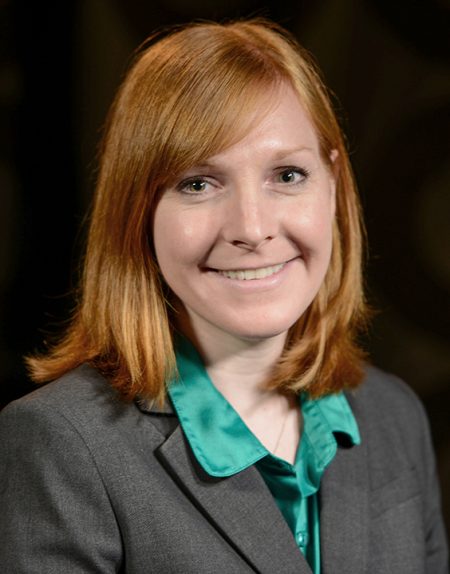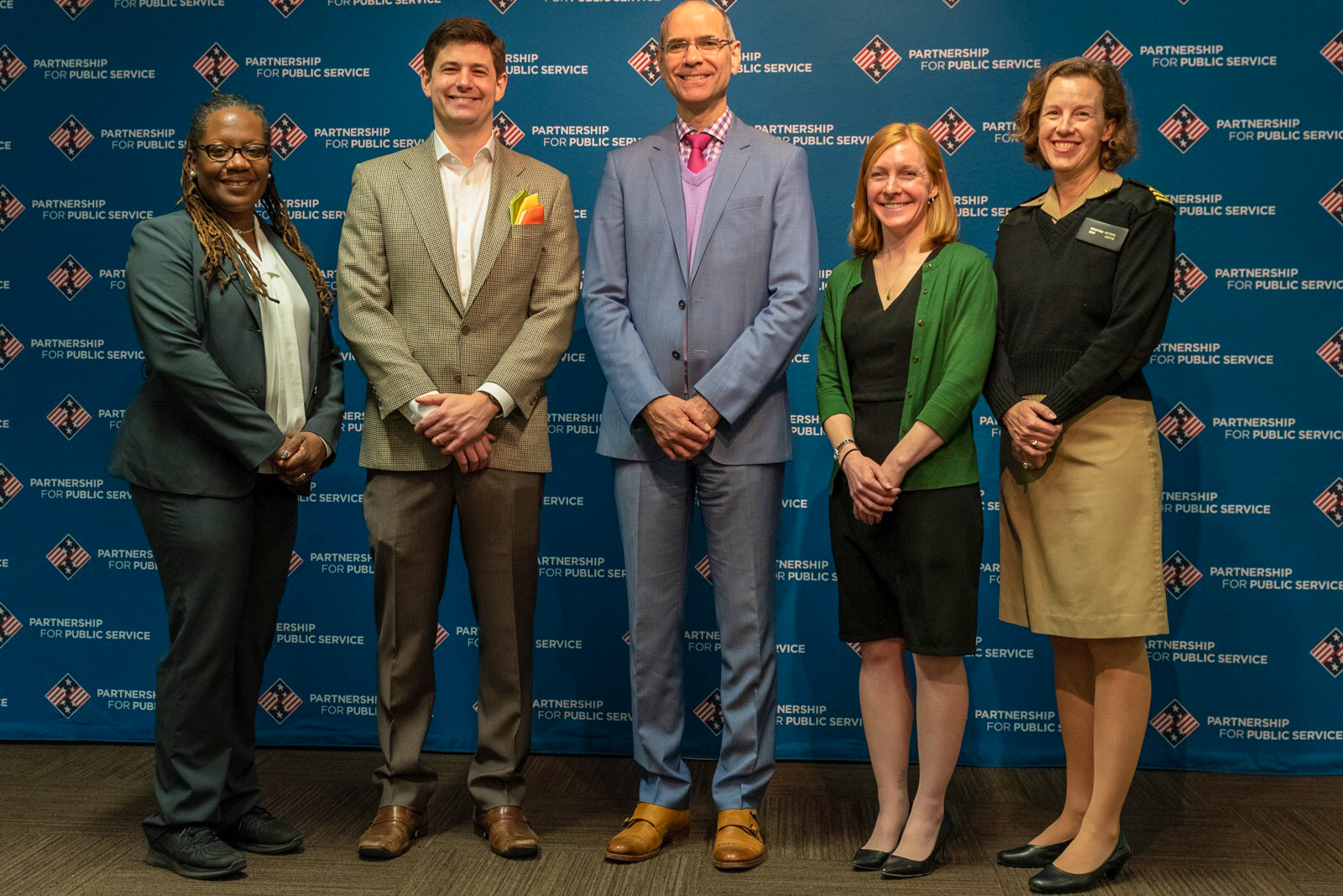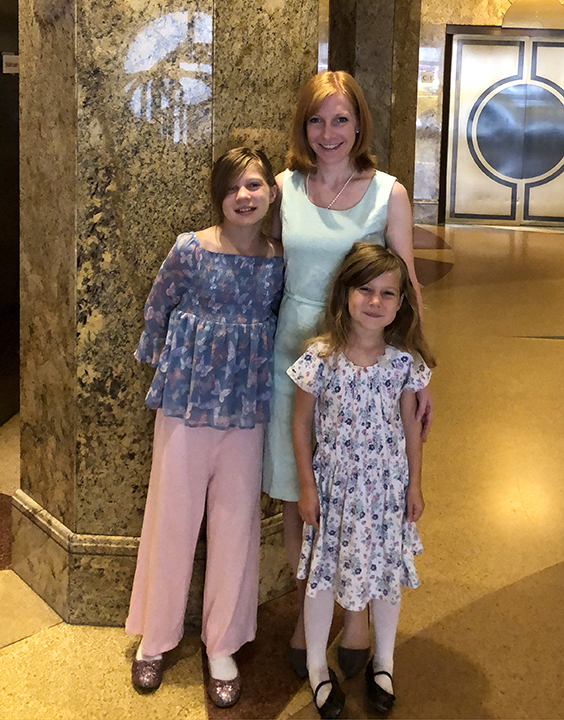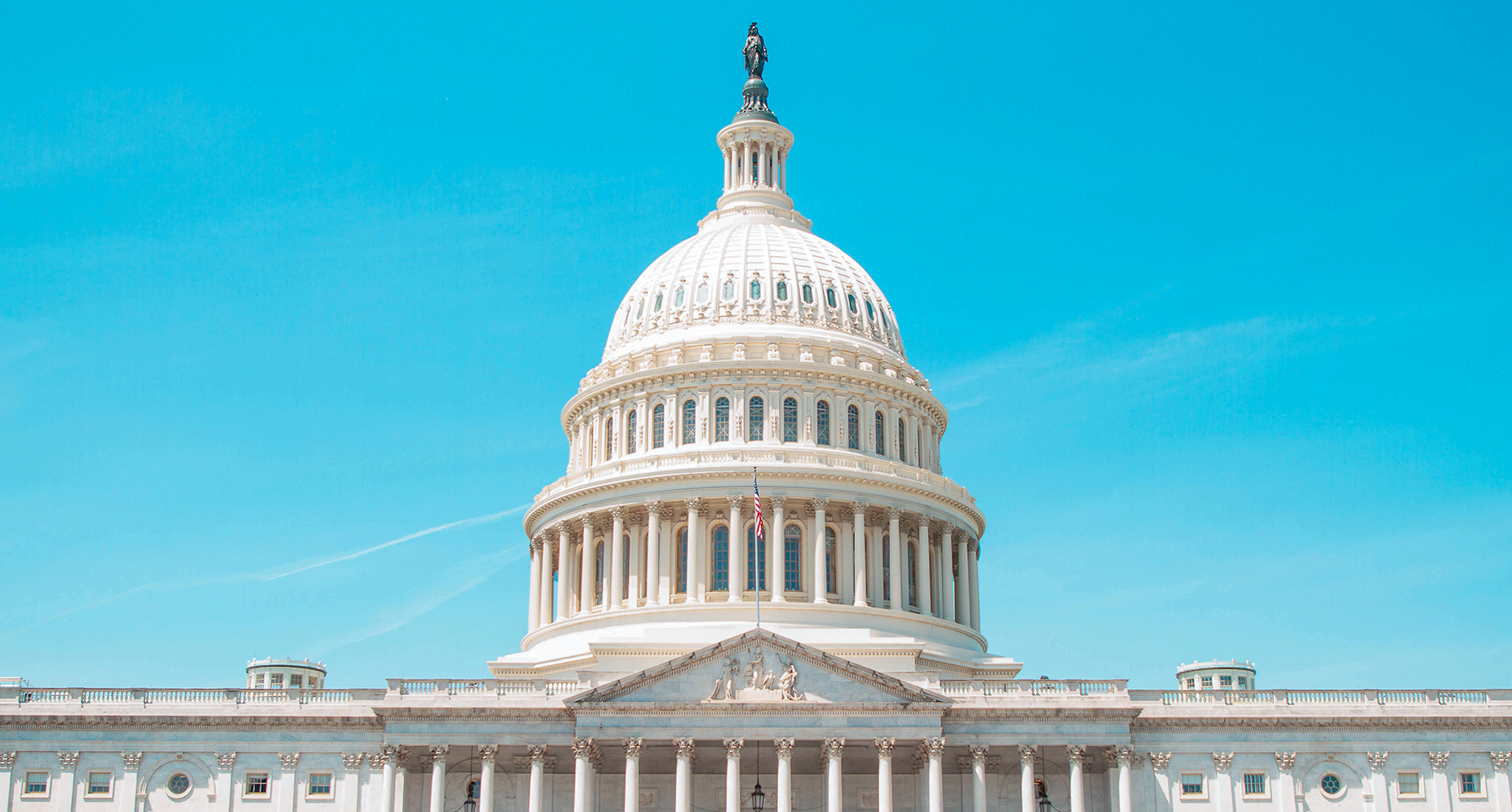Becky Heller (’05 economics, mathematics) has spent her life immersed in numbers.
Whether she was successfully solving story problems in elementary school, calculating derivatives in college or producing valuable data for the U.S. Census Bureau—Heller has always been drawn to the simplistic beauty of numbers and how they concisely convey facts and information.
“Math is something that I’ve always had an affinity for,” Heller said. “I took high school math classes in seventh grade and I always enjoyed logic puzzles and word problems. You focus on where your strengths lie and that’s what I’ve done throughout my career.”
Heller’s current focus is providing U.S. Congress members with valuable budget and economic projections and analysis. An economist for the Congressional Budget Office (CBO), Heller helps elected representatives, including Iowans like U.S. Sen. Charles Grassley and U.S. Rep. Cindy Axne, understand the cost and real-world impacts of their proposed legislation.
When legislators put forth new plans—like changes to the tax code, hikes in the federal minimum wage or a government-run healthcare program, CBO economists like Heller provide revealing forecasts. Their numbers tease out the consequences of those policies as well as the price tag.
“‘What will this add to the federal budget?’ is an important question and one that we need to answer,” Heller said.

Prior to joining the CBO, Heller spent nine years at the U.S. Census Bureau, doing what she describes as, “some interesting and important work that feeds into the current work I do at the CBO.”
The U.S. Census Bureau: Data producers
Most people associate the U.S. Census Bureau with the decennial census, a widely publicized national event which aims to count each person living in the United States. Although the 10-year census is the Bureau’s most well-known project, it represents a mere fraction of the agency’s ongoing work.
“It’s a big agency that employs around 4,300 people at its headquarters,” Heller said. “The U.S. Census Bureau conducts more than 130 surveys each year, and the data from those surveys are made available to the public and used by many people in so many ways.”
For example, economic development experts and entrepreneurs use population data to determine optimal locations for new businesses. Solid census data is foundational to research that is conducted by public and private sector scientists—from sociologists and computer scientists to epidemiologists. Print and broadcast journalists routinely include census data in their articles and television news pieces. City planners and government officials depend on data to plan improvements and expansions to hospitals, school lunch programs, emergency services, road construction and a host of local services.
Quality data are the cornerstone of many jobs that are carried out in a wide variety of professions.
From 2010-2019, Heller worked in the Labor Force Branch and rose to branch chief with nine analysts under her charge. Her previous work at the Bureau provides a window into the lesser-known surveys and data that are ongoing at the Bureau.
The SIPP: A tall drink of data
“As an analyst at Census, I worked on the Survey of Income and Program Participation, or SIPP, which is a longitudinal survey that follows the same people for about four years,” she said. “The survey is very rich in information about U.S. household incomes, net worth and sources of income, including government benefits, such as SNAP.”
The SIPP galvanizes a wealth of data from nearly 35,000 households. The resulting trove of information is our nation’s most comprehensive source of longitudinal, monthly data on U.S. households. Information about health insurance, food security, childcare, income, education levels and so much more, is gathered by the SIPP.
“Iowa State provided my first foray into doing research and working with data.That planted all of the seeds that have flourished today.”
“Policymakers use SIPP data to adjust government-benefit programs, analyze the solvency of Social Security and write new laws which impact the federal budget, tax policies and countless government programs,” Heller said.
Heller’s work on the SIPP involved: designing and developing the labor-related and wealth sections of the survey, meticulously crafting questions in those sections and ensuring that completed survey data was consistent and logical.
“We end up with an incredibly detailed snapshot of U.S. households as well as the demographic changes and paths that our citizens are experiencing in their lives,” she said.
Heller’s work at the Bureau was typically focused on national perspectives and macrotrends. In a micro-level twist involving Ames, Heller assisted colleagues at the Bureau of Labor Statistics to acquire additional data. Their work revealed that Ames had the lowest unemployment rate of any U.S. city. For several months in 2019, Ames made headlines for this novel data point that was unearthed using multiple sources, including the American Community Survey.
“That was a big deal for me, to be a small part of those statistics and to know the people who created them. I was at the gym listening to Planet Money and they were talking about Hickory Park and how difficult it was to hire servers due to the drastically low unemployment rates,” Heller said. “It was nice when my work circled back to my hometown of Ames, where I grew up and attended Iowa State University.”
Delving into numbers at Iowa State
It was Heller’s passion for mathematics that drove her to study economics at Iowa State University.
Although she didn’t take economics courses during her time at Ames High School, Heller entered Iowa State as an economics major, ready to dive into the science of demand curves, discount rates and deflation.
“Becky made it a real pleasure to be a professor. Her classmates, especially the ones who collaborated with her on group projects, were star struck by her. It was evident that she had a very bright future.”
“I liked that there was a great deal of math in economics and that’s why I chose to study it. The field ended up really clicking with me,” Heller said. “I loved the idea of putting structure around the way people behave. I was never interested in policy debates though. I preferred to focus on facts and numbers.”
Heller enrolled in numerous math classes, purely because she enjoyed tinkering with numbers and the challenges of calculus, derivatives and statistics. Her passion for numbers unintentionally left her just a few credits shy of a mathematics degree.
“So of course, I decided to add the mathematics major,” Heller said. “The majors complemented each other well.”
Working on double degrees in mathematics and economics, Heller enrolled in Advanced Money and Banking during her sophomore year. The class was led by Associate Professor Maureen Kilkenny, who is now a senior fellow with the National Center for Food and Agriculture Policy, a virtual think tank. The class transformed the trajectory of her career and carved her initial path toward graduate school.
Heller grew comfortable with a decision to earn a Ph.D. in economics as she worked on her undergraduate degree.
“Money and Banking was an amazing class that got me excited about working in the public sector,” Heller said. “Professor Kilkenny taught me how to use the material I learned in class and help people with it. I was immediately drawn to being involved in policy after she brought in a guest speaker from the U.S. Federal Reserve to speak with students.”
Although Heller graduated from Iowa State more than 15 years ago, Kilkenny has vivid memories of her along with high praise for Heller’s creativity and intelligence. Kilkenny noted Heller’s “mature-beyond-her-years work ethic” which left an indelible impression.
“Becky was the youngest student in my money and banking class and she earned the highest grade in the class, as well as a perfect score on two of the three exams, which was extremely rare,” Kilkenny said. “She distinguished herself by helping her classmates and organizing study groups. Some of the students she helped became so excited about economics that they became economics majors.”
Kilkenny recalled Heller as a founding member of the ISU Economics Club and serving on the board every year.
“Becky made it a real pleasure to be a professor,” Kilkenny said. “Her classmates, especially the ones who collaborated with her on group projects, were star struck by her. It was evident that she had a very bright future and that she would be very successful in graduate school.”
Heller earned her Ph.D. in economics from the University of Texas at Austin in 2010. After teaching economics at Austin Community College and several years at the Census Bureau—all roads led to her current job at the Congressional Budget Office.
Working the numbers for lawmakers
“I’ve been working as an economist for the Congressional Budget Office for one year, and already it’s been extremely rewarding,” Heller said.
Heller works in the Microeconomic Studies Division. Instead of producing census data, she’s now a consumer of that same census data.

“There’s a great bridge between my work at Census and my current work at the CBO,” Heller said. “Knowing how that data is produced and how ‘the sausage is made’ is really helpful to my current work at the CBO.”
Heller was excited to play a small role in helping to inform lawmakers who were considering pivotal legislation that made national headlines last spring. She worked on reviewing the final stages of a report that laid out the costs and impacts of a federal minimum wage law.
“We looked at the broader economic impacts and what would happen if the federal minimum wage was raised to $10, $12 or $15 dollars,” Heller said.
Last July, the House of Representatives, by a vote of 231 to 199, voted to increase the federal minimum wage to $15 by 2025. This was the first time in 10 years that the House voted to increase the federal minimum wage.
“It was terrific to be a part of that process and to play a small role in helping to inform lawmakers when they were considering that historic legislation,” Heller said. “The agency just released a 10-year budget outlook in January and our director testified before the House of Representatives using that report.”
Heller is quick to note that her work never involves partisan politics or opinions. Instead, she’s laser focused on imparting numbers and data.
“We don’t tell legislators what to do and we don’t offer suggestions,” she said. “We provide the data to illustrate the short- and long-range effects of their specific policies. They make the decisions about what those numbers mean and the directions in which they want to go.”
The 'competitive advantage' of being a Cyclone
Heller moves forward at the CBO, grateful for her Iowa State education. She fondly recalls the undergraduate opportunities, experiences and achievements that shaped her career, solidified her interest in economics and propelled her to serve in the public sector.
“I had terrific mentors at Iowa State, and the economics and math departments were fabulous,” Heller said. “I was at one of the biggest universities in Iowa and all of the opportunities that come with that, but I had incredible personal attention from professors with whom I had meaningful connections. Iowa State gave me the best of both worlds.”
As an undergraduate, Heller conducted research on the long-term impacts of gap years on college graduates’ income. The project was part of an Honors seminar which ignited her interest in research.
“We don’t tell legislators what to do and we don’t offer suggestions. “We provide the data to illustrate the short- and long-range effects of their specific policies."
“Iowa State provided my first foray into doing research and working with data,” Heller said. “That planted all of the seeds that have flourished today.”
Connecting back to Iowa State
Heller’s love for Iowa State and a desire to give back, compelled her to forge a connection with Iowa State student Sara Ronnkvist (’20 statistics). After reading about her passion for the census, Heller reached out.
“I read that Sara said working for the census was her dream job,” Heller said. “There’s not a lot of people like that, and I wanted to offer any advice or help that I could.”
Heller shared information about U.S. Census Bureau internships and insight on graduate school. She also provided guidance about research opportunities and careers in government.
“Becky definitely helped me to solidify my goals by providing terrific information that helped me plan out my graduate career,” Ronnkvist said. “I didn’t realize how many surveys the government administers and how they’re in different bureaus. I’m planning my graduate career around the terrific information that she provided.”
Bright future
Heller is excited about her future with the CBO and she is committed to the important work that she is doing.
April marked her first-year anniversary with the CBO.

“I learned so much working for Census, and I’m now able to use all of the information I know about producing data and apply that to my work at the CBO,” Heller said. “I still have connections at the Census and I try to facilitate conversations so the CBO has access to the best census data.”
Whether she’s helping a senator understand the cost of a consumption tax or demonstrating how a new veteran’s program will affect communities—she’s just getting started at the CBO.
No doubt this seasoned economist—who discovered her love of numbers at a young age—will continue making impacts in Congress. Her behind-the-scenes analysis, data and reports could shape policies that impact our communities, lives and futures.
“I think that’s what everybody hopes, that their work is going to make an impact in some way,” Heller said. “And even if it’s small, hopefully it is important to somebody.”
